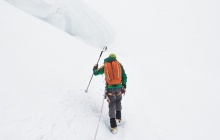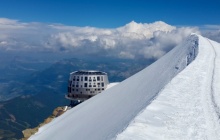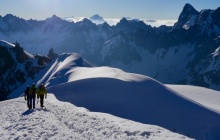Mont Blanc fast & light
Reserved for experienced and acclimated mountaineers, this trip offers the possibility of climbing Mont Blanc within three days through the normal way of the Goûter.
Itinerary
-
Day 1 From the Mont Blanc train to the Nid d'Aigle, walking to the Tête Rousse refuge (3167m)
 Easy first steps for our Mont Blanc ascent. We start by taking the Bellevue cable car in Les Houches to reach the Tramway du Mont Blanc and enjoy the ride until the Nid d'Aigle (2372m). An easy hike under the edge of Rognes and a small passage on the north face of the Mont Blanc, enjoying a stunning view over the Chamonix valley. We come out on a snowy plateau at the end of which is the brand-new refuge of Tête Rousse (3167m). The afternoon is devoted to resting and acclimatizing, enjoying the magnificent view of the north face of Bionnassay.
Easy first steps for our Mont Blanc ascent. We start by taking the Bellevue cable car in Les Houches to reach the Tramway du Mont Blanc and enjoy the ride until the Nid d'Aigle (2372m). An easy hike under the edge of Rognes and a small passage on the north face of the Mont Blanc, enjoying a stunning view over the Chamonix valley. We come out on a snowy plateau at the end of which is the brand-new refuge of Tête Rousse (3167m). The afternoon is devoted to resting and acclimatizing, enjoying the magnificent view of the north face of Bionnassay.
Warning: cable cars will not be open for the first two departures of June, this will increase the hiking time (about 1000m of additional vertical drop) to arrive to the Nid d'Aigle.Positive difference in altitude : about 800m / Max Alt : 3167m / Walking time : 3 to 4 hours
-
Day 2 Going up to the Goûter refuge
 After a nice breakfast at the refuge, we leave towards the Goûter corridor. You must follow your guide’s instructions. Once you are on the ridge, you can see the Goûter refuge: a few meters more of walking and you will rest your weary feet before the big climbing day.
After a nice breakfast at the refuge, we leave towards the Goûter corridor. You must follow your guide’s instructions. Once you are on the ridge, you can see the Goûter refuge: a few meters more of walking and you will rest your weary feet before the big climbing day.
Walking time : 3 to 4 hours / Positive difference in altitude : about 700m / Negative difference in altitude : about 700m
-
Day 3 Mont Blanc Ascent (4810m)
 Today is the day you will reach the top of Europe!
Today is the day you will reach the top of Europe!
We wake up very early, even before the sun rises, have a big breakfast and we start our hike heading to the Goûter dome. We are moving forward, slopes are gentle and we take a calm and steady pace.
We then start to climb up for a few hours, finding ourselves between sky and ground walking on a magnificent, sometimes aerial, slope. Finally, the peak appears.
Here we are, standing stock-still at an altitude of 4 810 meter, open-mouthed and agog.
After absorbing the breath-taking view of the 360° panorama, it’s time to come back down to the Nid d'Aigle, where we hop back on the Tramway du Mont Blanc. A final round of cable car and here we are back in Les Houches.Walking time : 10 to 12h / Positive difference in altitude : about 1000m / Negative difference in altitude : about 2500m / Max Alt : 4810m
Dates & prices
International departures:
No departure for now
Departures for French-speaking groups:
| From | To | Price per person | Guaranteed | Booking |
|---|---|---|---|---|
| €1,790 | No | Book now! | ||
| €1,790 | Yes | Fully booked | ||
| €1,790 | No | Book now! | ||
| €1,790 | No | Book now! |
Trip code: AMBC
Included
- The technical organisation of the trip
- A high mountain guide's supervision
- Accommodation in refuges full-board
- Cable car rides necessary to the smooth running of the trip (except for the first departure in June)
- The collective technical equipment (ropes, ice axes)
Not included
- Individual transportation assured by your personal vehicle
- Individual technical equipment
- Registration fees
- Drinks & personal expenses
- Snacks (cereal bars, dried fruits, chocolate bars, etc.) according to your own convenience
- Insurance & assistance: cancellation, research and rescue by helicopter in high mountain (in France, Italy and Switzerland) hospitalization and repatriation
- Everything that isn't mentioned in the "included" section
Notes
International flights
Terms and conditions
Booking conditions
Invoice procedure
Cancellation policy
- Cancellation received more than 30 days prior to the departure date: a sum of €50 per person will be retained
- Cancellation received 30 to 21 days before the departure date: your deposit, 30% of the total trip price will be retained
- Cancellation received 20 to 14 days before the departure date: 50% of the total trip price will be retained
- Cancellation received 13 to 7 days before the departure date: 75% of the total trip price will be retained
- Cancellation received less than 7 days before the departure date: 100% of the total trip price will be retained
- Fixed airfares: if your airline ticket was issued in advance, often done to avoid significant surcharges, you will be charged 100% of any non-refundable fees if you wish to change or cancel your flight plan.
- Fixed in-country costs: early charges for firm bookings will be charged if you cancel or modify your trip.
- Insurance costs: if you have taken out comprehensive or cancellation insurance, the cost of insurance is due and cannot be refunded.
Changes to travel contract
Pricing
Contract transfer
Insurance
Practical info
Staff
Food
- Lunch picnics
- Diners : meals prepared by shelter keepers
- Take some race food according to your own tastes (cereals bars, chocolate bars, dry fruits,…). You can buy some in Champex village if you need.
- Water is not for free in refuges (from 5 to 8 euros one bottle). We advise you to bring some water purification tablets (Aquatabs or Micropur) in order to drink tap water.
- Personal drinks are not included in the trip's price
- Bring some Swiss francs for coffees, fruit juices, coke or beers during breaks… Shelters usually don’t accept bank card payments and Euros.
Accommodation
Transportation
Budget & exchange
Tips
Supplied equipment
- Collective equipment (ropes, carabiners, ...)
- Slippers and blankets while in refuges
Material
- Mountaineering boots that you can fit crampons onto (with rigid soles)
- A comfortable mountaineering backpack (40/50L)
- Ice axe, crampons, harness with locking carabiner, helmet
- One or two collapsible walking poles (depending on what you are used to)
- A thermos or water bottle (1.5L)
- A warm bonnet
- A hat, cap and/or a scarf
- Sunglasses for glacier, category 4 + ski goggles
- A pair of warm gloves or mitten
- A pair of fleece or wool gloves or mittens
- A pair of silk gloves or mittens
- 1 breathable undershirt, preferably long sleeves (e.g. Capilene or polypro)
- Fleece or heavy jacket
- Down jacket (optional but highly appreciated during the peak day if the weather is very cold)
- Wind and waterproof shell jacket with hood (Goretex or similar)
- A pair of comfortable mountaineering pants
- Wind and waterproof over pants (Goretex or similar)
- Long underwear or running tights (e.g. Capilene or polypro)
- 2 pairs of socks : a warm one and a lighter one
- Gaiters
- Light-weight sleeping bag liner, preferably silk (wool covers are provided by the refuge)
- Toiletries : only tooth-brush and tooth-pasteSunscreen (face and lips)
- A head lamp with spare batteries and bulb
- Pocket knife
- A rain cover for your backpack (optional)
Luggage
- During the training and the climb, you will carry your own equipment and packed lunches in your backpack (40-50L)
- The rest of your luggage will stay in Chamonix and can be kept in another bag (travel bag)
Medicine
- Personal medication
- Pain killers (preferably Paracetamol)
- Double skin
- Elastoplast (excellent to prevent blisters)
- Bandages
- Disinfectant
- Anti-inflammatory
- Antispasmodic
- Anti-diarrheal
- Anti-vomiting
- Intestinal antiseptic
- Eye drops
- Light sleeping pills
- Ear plugs
Passport
Visa
- Up to 90 days visit in France : citizens from most countries do not need a visa to visit France.
- Over 90 days visit in France : non-EU or non-EFTA citizens must have a visa to visit France over 90 days.
Identity card
Mandatory vaccines
Health information & recommendations
Weather
Electricity
Local time
Sustainable tourism
- Most of our accommodations are run by locals, thus ensuring that the largest part of the revenue generated through your trip will stay within the region.
- France is known for its exquisite cuisine. The art of cooking and the joy of eating are part of everyday life. Each region has its particular foods and flavors which we would like you to explore and appreciate.
- Water is a precious and rare good. Our team and those travelling with us are thus advised to use it with consideration and avoid excessive water use where possible.
- Please try to recycle your waste whenever possible, even though recycling may not be a well-known concept in all areas.
- Be cautious and respectful when hiking. Make sure to wear suitable footwear and avoid picking flowers, moving stones or lighting fires.


